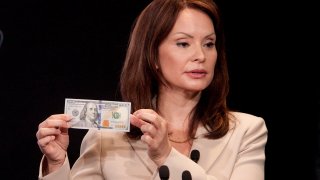
If you have a dollar bill in your wallet, there's a good chance it bears the name of Rosa "Rosie" Rios. She might be partially responsible for any brand-new quarters in your pocket, too.
Thanks to her time as U.S. treasurer in the Obama Administration, from 2009 to 2016, Rios' signature appears on about $1.8 trillion worth of American currency, the majority of the roughly $2.2 trillion currently in circulation. She spent much of that time pushing for greater female representation on currency, an effort that's finally bearing fruit with quarters featuring poet Maya Angelou rolling out this week.
While in government, Rios pushed for legislation that eventually became the Circulating Collectible Coin Redesign Act, which passed in 2020 and created the program behind this month's rollout of Angelou quarters. The program plans to launch more quarters later this year featuring famed astronaut Sally Ride, Chinese-American actress Anna May Wong, activist Nina Otero-Warren, and Wilma Mankiller, the first female principal chief of the Cherokee Nation.
Rios also pushed for Harriet Tubman to become the new face of the $20 bill, a plan that was shelved by the Trump administration but revived last year by the Biden administration.
Her hope, she now tells CNBC Make It, is that seeing more women – particularly women of color – on U.S. currency will inspire future generations of female leaders.
"For a lot of young girls, [like] my daughter, and hopefully a lot of future leaders, that will symbolize a lot for them – what I call 'inspirations for aspirations,' using history to inspire our future," Rios says. "I really kind of boiled it down to this one question that I asked myself, which was: We value what we see every day, but do we see what we value?"
Money Report
Rios, now the CEO of real estate investment consulting firm Red River Associates and an investor on online reality show "Unicorn Hunters," says she's been asking those kinds of questions since her own childhood. She and her eight siblings were raised in Hayward, California, by their single mother, Guadalupe Rios – a Mexican immigrant whom Rios says is "still my champion."
Their mother, Rios says, focused on instilling a strong work ethic in all of her children. All nine siblings worked their way into and through college, Rios says, starting by picking fruit on a farm near their hometown.
In high school, Rios took a job shelving books at her local library. Later, as a student at Harvard University, she worked up to 25 hours per week on top of her studies, taking another library job at the school while sending money home to her family.
The experiences stuck with her throughout a post-graduation career in real estate, finance and economic development, she says. And, she adds, they're a significant reason why she chose to champion legislation like the Circulating Collectible Coin Redesign Act.
"I never in a million years thought that I would ever see my name on $1.8 trillion in currency," Rios says. "For me, it's not just my name on the money. It's my kids' name on the money."
Few real-life women have ever been featured on U.S. currency. The U.S. Mint issued dollar coins honoring Sacagawea in 2000 and Susan B. Anthony as early as 1979, and Martha Washington and Pocahontas appeared on some bills in the 1800s. But Rios says that mostly only allegorical women, like Lady Liberty, have appeared on the country's print money.
For Rios, that's a problem: Across the world, currencies feature some of their countries' most important historical figures or symbolic monuments. So when women aren't featured on U.S. currency, a literal form of financial value, "you don't feel valued as a woman," she says.
"If we aren't valuing who we are as people in our history, then obviously that's going to influence where we think we can go in the future," she says. "So it isn't about me. It is about my daughter."
Sign up now: Get smarter about your money and career with our weekly newsletter
Don't miss:
A former U.S. Treasurer on crypto investing in 2022: 'The train has already left the station'
Former U.S. Treasurer on the economy: 'I'm much more optimistic about 2022'






